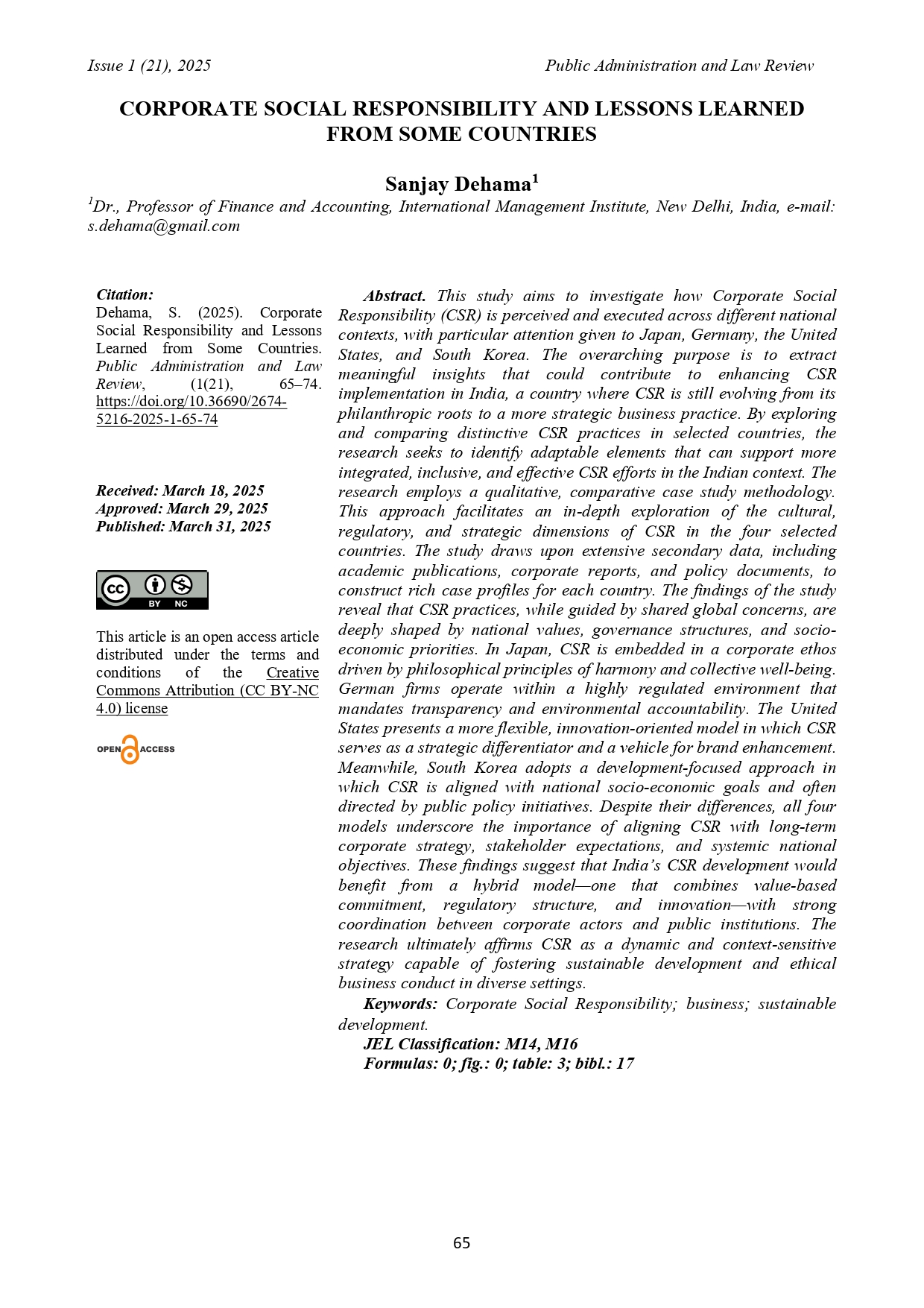CORPORATE SOCIAL RESPONSIBILITY AND LESSONS LEARNED FROM SOME COUNTRIES
DOI:
https://doi.org/10.36690/2674-5216-2025-1-65-74Keywords:
Corporate Social Responsibility, business, sustainable developmentAbstract
This study aims to investigate how Corporate Social Responsibility (CSR) is perceived and executed across different national contexts, with particular attention given to Japan, Germany, the United States, and South Korea. The overarching purpose is to extract meaningful insights that could contribute to enhancing CSR implementation in India, a country where CSR is still evolving from its philanthropic roots to a more strategic business practice. By exploring and comparing distinctive CSR practices in selected countries, the research seeks to identify adaptable elements that can support more integrated, inclusive, and effective CSR efforts in the Indian context. The research employs a qualitative, comparative case study methodology. This approach facilitates an in-depth exploration of the cultural, regulatory, and strategic dimensions of CSR in the four selected countries. The study draws upon extensive secondary data, including academic publications, corporate reports, and policy documents, to construct rich case profiles for each country. The findings of the study reveal that CSR practices, while guided by shared global concerns, are deeply shaped by national values, governance structures, and socio-economic priorities. In Japan, CSR is embedded in a corporate ethos driven by philosophical principles of harmony and collective well-being. German firms operate within a highly regulated environment that mandates transparency and environmental accountability. The United States presents a more flexible, innovation-oriented model in which CSR serves as a strategic differentiator and a vehicle for brand enhancement. Meanwhile, South Korea adopts a development-focused approach in which CSR is aligned with national socio-economic goals and often directed by public policy initiatives. Despite their differences, all four models underscore the importance of aligning CSR with long-term corporate strategy, stakeholder expectations, and systemic national objectives. These findings suggest that India’s CSR development would benefit from a hybrid model—one that combines value-based commitment, regulatory structure, and innovation—with strong coordination between corporate actors and public institutions. The research ultimately affirms CSR as a dynamic and context-sensitive strategy capable of fostering sustainable development and ethical business conduct in diverse settings.
Downloads
References
Arena, C., Liong, R., & Vourvachis, P. (2018). Carrot or stick: CSR disclosures by Southeast Asian companies. Sustainability Accounting, Management and Policy Journal, 9(4), 422-454.
Danisch, C. (2021). The relationship of CSR performance and voluntary CSR disclosure extent in the German DAX indices. Sustainability, 13(9), 4904.
Fuente, J. A., García-Sanchez, I. M., & Lozano, M. B. (2017). The role of the board of directors in the adoption of GRI guidelines for the disclosure of CSR information. Journal of Cleaner Production, 141, 737-750.
Galbreath, J. (2018). Is board gender diversity linked to financial performance? The mediating mechanism of CSR. Business & Society, 57(5), 863-889.
Nguyen, Q. K. (2022). Determinants of bank risk governance structure: A cross-country analysis. Research in International Business and Finance, 60, 101575. doi:https://doi.org/10.1016/j.ribaf.2021.101575
Nguyen, Q. K. (2023a). Does the financial flexibility prevent stock price crash risk during COVID-19 crisis? Evidence from the Vietnamese stock market. Heliyon, 9(11).
Nguyen, Q. K. (2023b). Macroeconomic determinants of economic growth in low-and mid-income countries: new evidence using a non-parametric approach. Applied Economics Letters, 1-6.
Nguyen, Q. K. (2024a). The Development of the Life Insurance Market and Bank Stability in Developing Countries. Heliyon.
Nguyen, Q. K. (2024b). Globalization, credit information sharing and financial stability in developing countries. Economic Change and Restructuring, 57(6), 1-21.
Nguyen, Q. K. (2024c). How Does Financial Flexibility Strategy Impact on Risk Management Effectiveness? Sage Open, 14(2), 21582440241240842.
Nguyen, Q. K. (2024d). Women in top executive positions, external audit quality and financial reporting quality: evidence from Vietnam. Journal of Accounting in Emerging Economies, 14(5), 993-1019.
Nguyen, Q. K., & Dang, V. C. (2023). Renewable energy consumption, carbon dioxide emission and financial stability: does institutional quality matter? Applied Economics, 1-18.
Rashid, A., Shams, S., Bose, S., & Khan, H. (2020). CEO power and corporate social responsibility (CSR) disclosure: does stakeholder influence matter? Managerial auditing journal, 35(9), 1279-1312.
Semenescu, A., & Curmei, C. V. (2015). Using CSR to mitigate information asymmetry in the banking sector. Management & Marketing, 10(4), 316-329.
Tran, D. L., & Nguyen, Q. K. (2025). The moderating effect of monetary policy and ESG practices on the relationship between leverage and firm value in ASEAN-5 emerging countries. Applied Economics, 1-16.
Vishwanathan, P., van Oosterhout, H., Heugens, P. P., Duran, P., & Van Essen, M. (2020). Strategic CSR: A concept building meta‐analysis. Journal of Management Studies, 57(2), 314-350.
Wang, Z., Hsieh, T. S., & Sarkis, J. (2018). CSR performance and the readability of CSR reports: too good to be true? Corporate Social Responsibility and Environmental Management, 25(1), 66-79.

Downloads
Published
How to Cite
Issue
Section
License

This work is licensed under a Creative Commons Attribution-NoDerivatives 4.0 International License.





